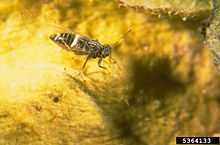Candidatus Liberibacter
From Wikipedia, the free encyclopedia
| Candidatus Liberibacter | |
|---|---|
 | |
| The potato psyllid, Bactericera cockerelli, feeds on a potato and infects it with Candidatus Liberibacter solanacearum, the bacterium that causes zebra chip disease. | |
| Scientific classification | |
| Kingdom: | Bacteria |
| Phylum: | Proteobacteria |
| Class: | Alpha Proteobacteria |
| Order: | Rhizobiales |
| Family: | Rhizobiaceae |
| Genus: | Candidatus Liberibacter |
| Species | |
|
See text | |
Candidatus Liberibacter is a genus of gram-negative bacteria in the Rhizobiaceae family. The term Candidatus is used to indicate that it has not proved possible to maintain this bacterium in culture. Detection of the liberibacters is based on PCR amplification of their 16S rRNA gene with specific primers. Members of the genus are plant pathogens mostly transmitted by psyllids. The genus was originally spelled Liberobacter.[1]
Species
Named species include:[2]
- Liberibacter africanus - Originating in Africa and a causal agent of huanglongbing, also known as citrus greening disease and vectored by the African citrus psyllid Trioza erytreae.[3]
- Liberibacter americanus - A novel species from Brazil described in 2005 and associated with huanglongbing, also known as citrus greening disease and vectored by the Asian citrus psyllid Diaphorina citri.[4]
- Liberibacter asiaticus - Originating in Asia and a causal agent of huanglongbing, also known as citrus greening disease and vectored by the Asian citrus psyllid Diaphorina citri.[5]
- Liberibacter europaeus - A novel species described in 2010, found in pear trees where it seems to cause no symptoms and vectored by the psyllid, Cacopsylla pyri.[6]
- Liberibacter psyllaurous - A novel species described in 2008 from solanaceous host plants potato and tomato and vectored by the potato tomato psyllid (TPP), Bactericera cockerelli.[7] Liberibacter psyllaurous plays a dual role as a plant pathogen and as an inherited bacterial endosymbiont. This symbiont modifies tomato defenses in favor of itself and its psyllid vector[8]
- Liberibacter solanacearum[9] - A causal agent of zebra chip disease in potatoes and vectored by the potato tomato psyllid (TPP), Bactericera cockerelli.[10] There are four haplotypes described within this species, designated LsoA, LsoB (from solanaceous plants in North America) and LsoC, LsoD (from carrots in Europe)[11]
- Liberibacter crescens[12] - isolated from papaya growing in Puerto Rico.
The commonly used abbreviations are Laf, Lam, Las, Leu, Lso and Lcr respectively.
References
- ↑ Taxonomy browser
- ↑ UniProt Consortium
- ↑ EPPO
- ↑ ‘Candidatus Liberibacter americanus’, associated with citrus huanglongbing (greening disease) in São Paulo State, Brazil
- ↑ Featured Creatures
- ↑ 'Candidatus Liberibacter europaeus' sp. nov. that is associated with and transmitted by the psyllid Cacopsylla pyri apparently behaves as an endophyte rather than a pathogen.
- ↑ A New Huanglongbing Species, "Candidatus Liberibacter psyllaurous," Found To Infect Tomato and Potato, Is Vectored by the Psyllid Bactericera cockerelli (Sulc){triangledown}
- ↑ Manipulation of Plant Defense Responses by the Tomato Psyllid (Bactericerca cockerelli) and Its Associated Endosymbiont Candidatus Liberibacter Psyllaurous
- ↑ ‘Candidatus Liberibacter solanacearum’, associated with plants in the family Solanaceae
- ↑ Evidence that the Zebra Chip Disease and the Putative Causal Agent Can be Maintained in Potatoes by Grafting and In Vitro
- ↑ http://link.springer.com/article/10.1007%2Fs10658-012-0121-3 A new haplotype of “Candidatus Liberibacter solanacearum” identified in the Mediterranean region
- ↑ Complete genome sequence of Liberibacter crescens BT-1
This article is issued from Wikipedia. The text is available under the Creative Commons Attribution/Share Alike; additional terms may apply for the media files.